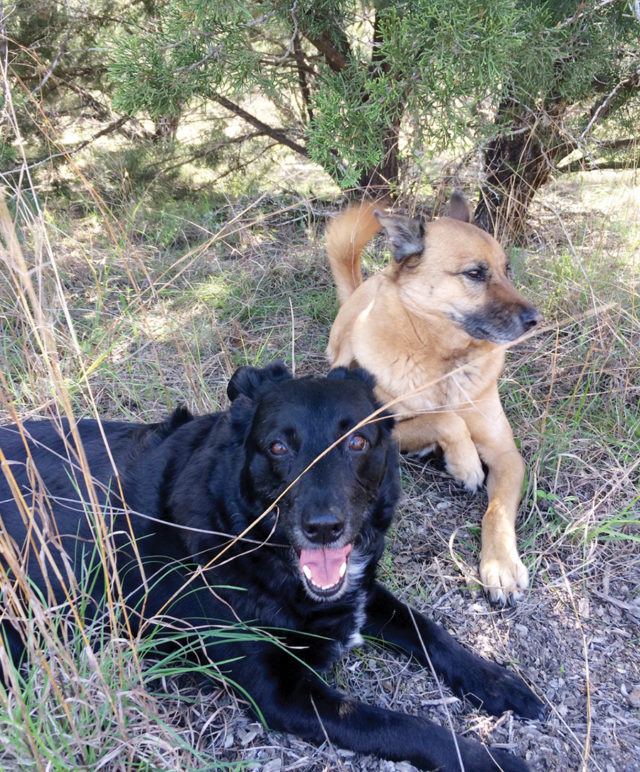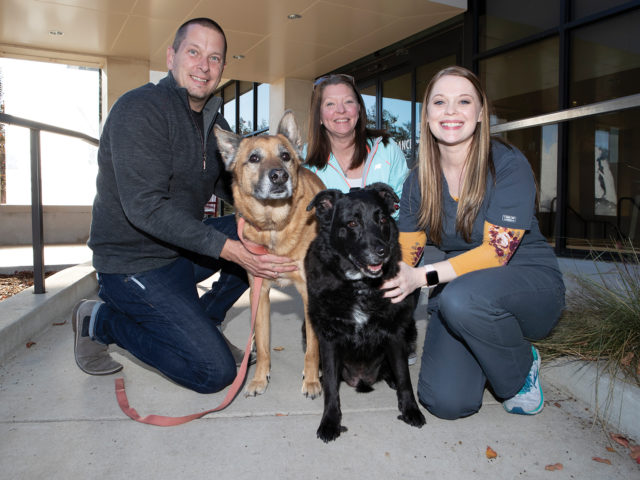Petco Foundation Grant Assists Patients Working To BTHO Cancer
Story by Dorian Martin

From the moment Flapjack was adopted as a puppy from the Houston Humane Society in 2008, he became an integral part of his new family.
“He was super smart from the time we got him,” said Flapjack’s owner Robert Schmidt. “He was very inquisitive and he seemed tuned in with the world, not just in a puppy or a dog way, but in a sentient way.”
Flapjacks’s ability to provide empathetic support was critical when Schmidt’s first wife, Lori, developed cancer in 2015.
“When somebody is dealing with a terminal illness, a lot of your friends and family don’t know how to react so they stop coming around as much,” he remembered. “Flapjack and his sister and brother were often the only shoulder to cry on while Lori was going through her illness and when she passed away in 2017.”
Soon after, Flapjack came to need support of his own.
In 2018, Schmidt took the dog to Springtown Veterinary in San Marcos for a dental cleaning and agreed to have a discounted ultrasound while Flapjack was sedated. That test identified a tiny, possibly cancerous tumor on Flapjack’s bladder, so Schmidt asked for a referral to the Texas A&M Veterinary Medical Teaching Hospital (VMTH).
After the tumor was confirmed as bladder cancer, his initial conversations with the VMTH staff were difficult.
“When I went there and talked to some of the doctors and the oncology nurses, they painted a bleak picture,” he said, “and I believed it because I got the same talk in 2015 when my wife was diagnosed with cancer.”
Despite being unsure that surgery could cure the cancer, Schmidt and the VMTH Oncology Service decided to do everything possible to try to heal Flapjack, despite the cost.
Thanks to the talented veterinary surgeons, Flapjack’s operation was successful. They removed the entire tumor and, in subsequent check-ups, found that the cancer has not returned.
“I’m a realist and every checkup I expect a recurrence,” Schmidt said. “They had said that he would probably not be here by now, a year-and-a-half later.
“If we hadn’t found the tumor and if it weren’t for the good people in Springtown Veterinary suggesting the ultrasound, Dr. Dan Allen (Flapjack’s veterinarian) being quick and giving me the referral to A&M, and the good work of the VMTH staff, he wouldn’t be with us,” he said.
Schmidt was overjoyed to return home with Flapjack, but he also was concerned about paying off a bill for $12,000, the total cost to treat the bladder cancer.

Fortunately, the VMTH and Petco Foundation were able to help with a Pet Cancer Treatment grant.
The Petco grant, awarded to the Texas A&M College of Veterinary Medicine & Biomedical Sciences (CVM) in 2019, stipulated that the grant’s funds assist pet owners facing extensive costs in treating their animal’s cancer. In the time since, several pet owners have tapped into these funds to defray costs.
The financial support from Petco and other funding sources helped Schmidt greatly.
“You don’t realize how generous people are when it comes to your animal family,” he said. “It always chokes me up when someone tells me that they’ve given a gift for Flapjack’s treatment because it renews my faith in people. I love Flapjack like my son and companies like Petco recognize that and do things to take some of the pressure off of you so you can worry about making your animal well. It’s a huge blessing.”
A Company That Cares
The Pet Cancer Treatment grant program primarily supports cancer treatments at large- and medium-sized oncology departments in colleges of veterinary medicine.
“This grant helps pet owners with the pretty extensive costs associated with cancer therapy in animals,” said Dr. Heather Wilson-Robles, CVM associate professor and Dr. Fred A. and Vola N. Palmer Chair in Comparative Oncology. “It is meant to help people pay for those things so that they can actually get their animals treated if they want to.”
The Petco Foundation grant is the only industry grant funding that the oncology team, which is the second-most used service in the VMTH behind the emergency room, has received to support patient care.
“We’re extremely grateful for all of our donors, but the Petco Foundation funds have allowed us to do a lot more for clients because it is such a large donation,” Wilson-Robles said.
The grant’s funds provide an important financial resource for care that can quickly escalate and for innovative therapies that may benefit the pet.
“Since we’re an integrated service, almost all our patients will receive multimodality therapy, which is what tends to make it expensive,” Wilson-Robles said. “Many of them have preoperative radiation, then they’ll have surgery, then they’ll get chemo. The cost really does build up.
“Also, if there is a fairly novel or new treatment and we’re thinking outside the box, sometimes that costs money,” she said. “We can support the owner and not feel like we’re charging them for something when we don’t know what the outcome’s going to be.”
The Petco Foundation grant has also been a boon for the VMTH’s staff.
“It’s been huge for morale, especially for some of the house officers (who serve as liaisons between clients and clinicians). They’re on the front lines, and they get really attached to these patients and clients over time,” Wilson-Robles said. “For the house officers to be able to say, ‘The clients are out of money; is there any way we can help them with these funds?’ and for us be able to say ‘Yes’ really helps them feel good.”
Today, at 12 years old, Flapjack is still healthy, active, and cancer-free.
“He’s doing well and hopefully he’ll live a full life and another three, four, or five years,” Schmidt said. “When you see him, he’s really like a puppy. He doesn’t look like a 12-year-old dog. He’s just a little happy rambunctious puppy dog.”
Like Flapjack, many beloved pets will benefit from the Petco Foundation grant. Their owners and the VMTH oncology staff can focus on doing everything possible to BTHO cancer, knowing the Petco Foundation is there to support them.
###
Note: A version of this story originally appeared in the Spring 2020 edition of CVM Today.
For more information about the Texas A&M College of Veterinary Medicine & Biomedical Sciences, please visit our website at vetmed.tamu.edu or join us on Facebook, Instagram, and Twitter.
Contact Information: Jennifer Gauntt, Director of Communications, Texas A&M College of Veterinary Medicine & Biomedical Sciences; jgauntt@cvm.tamu.edu; 979-862-4216


